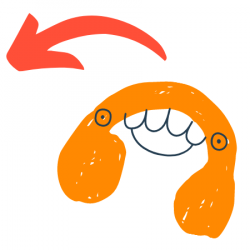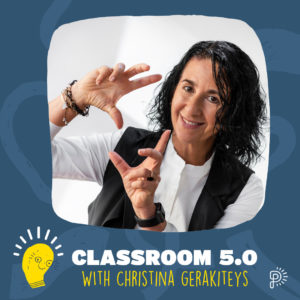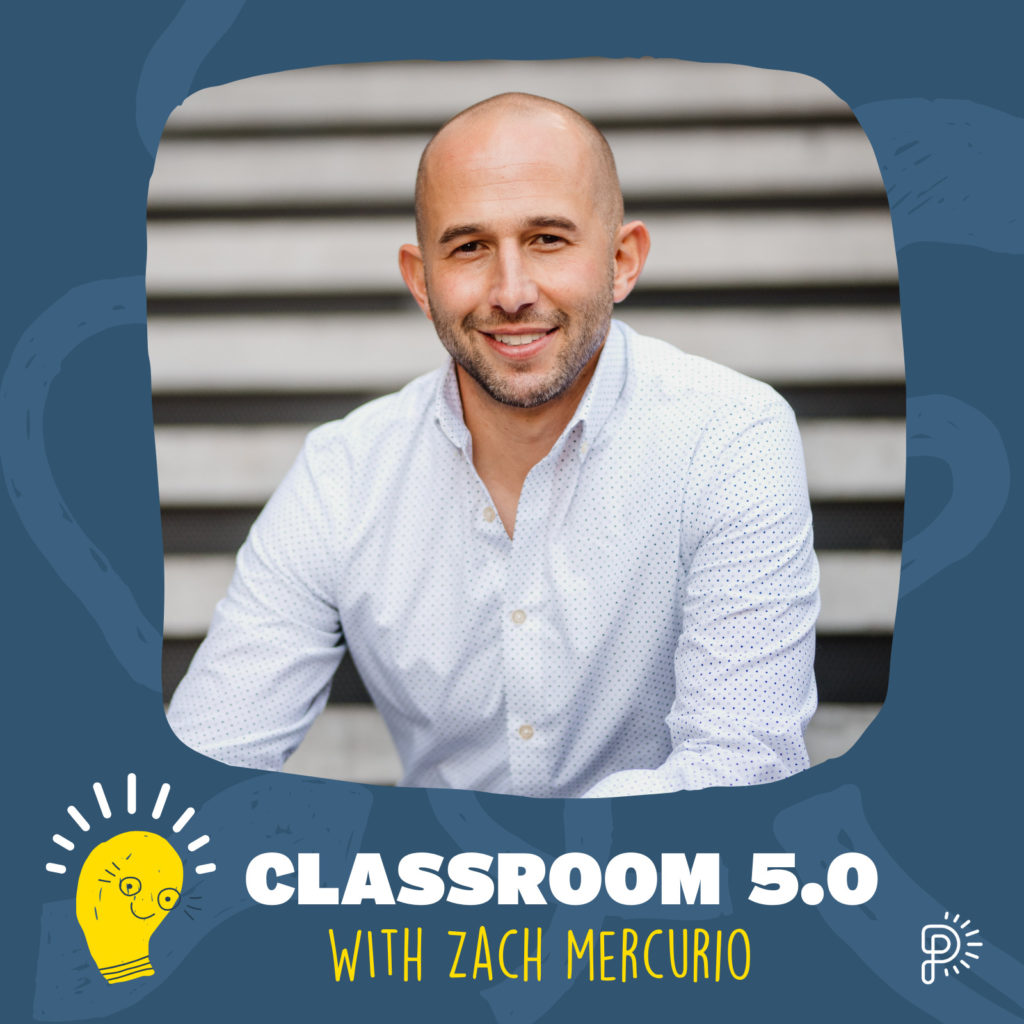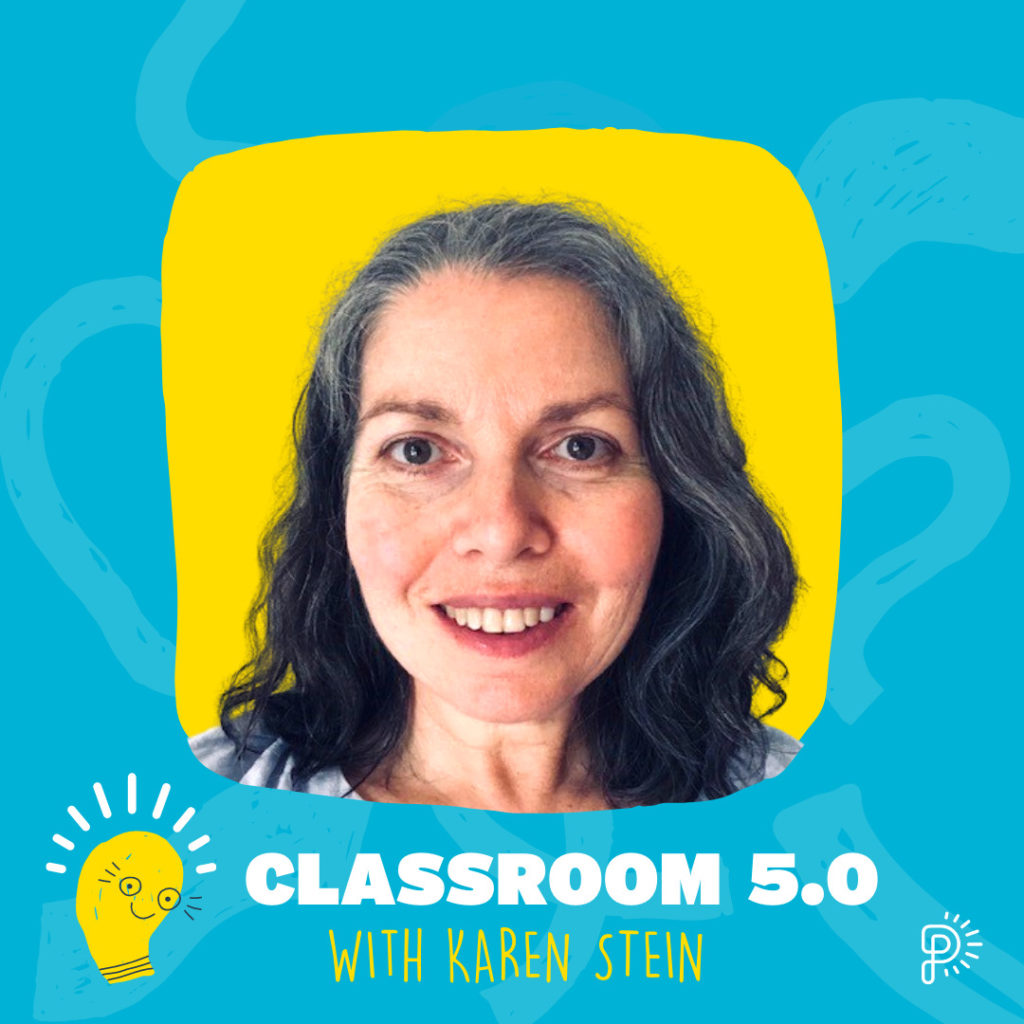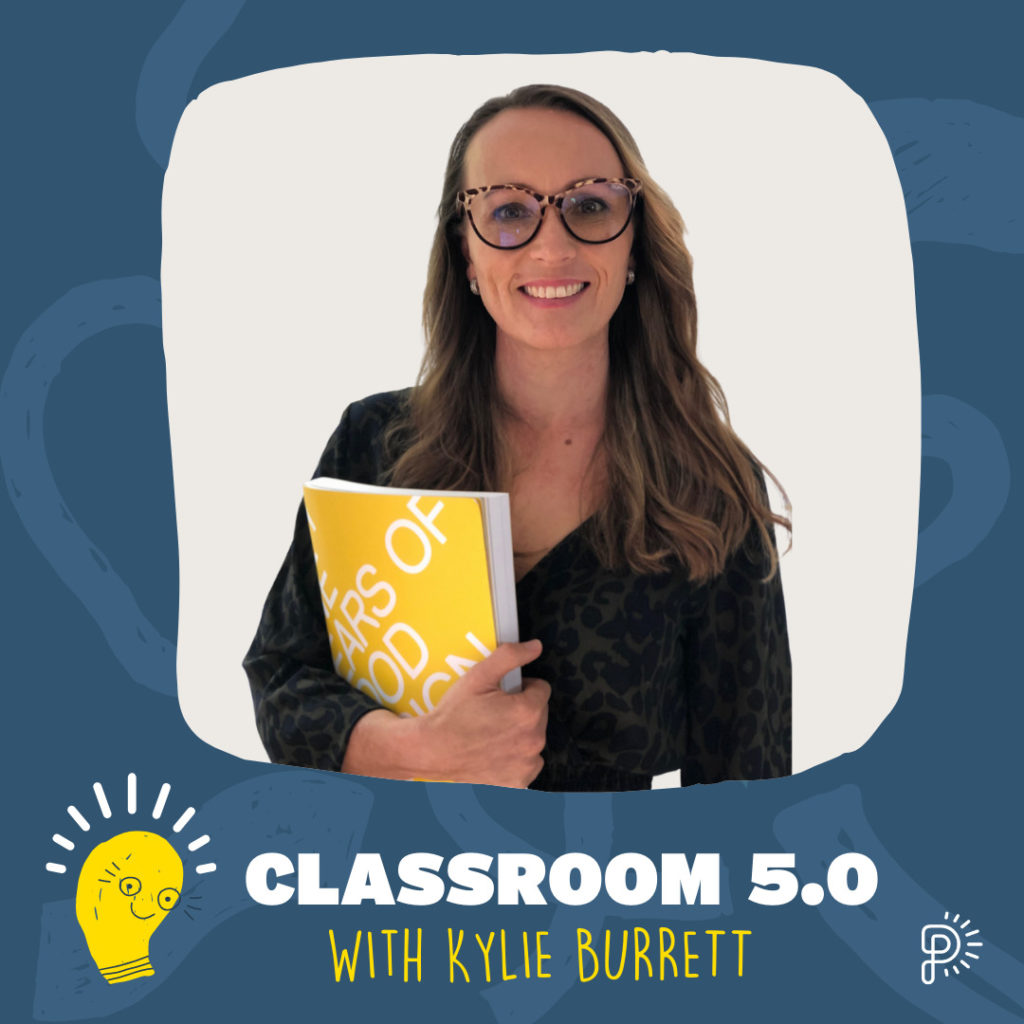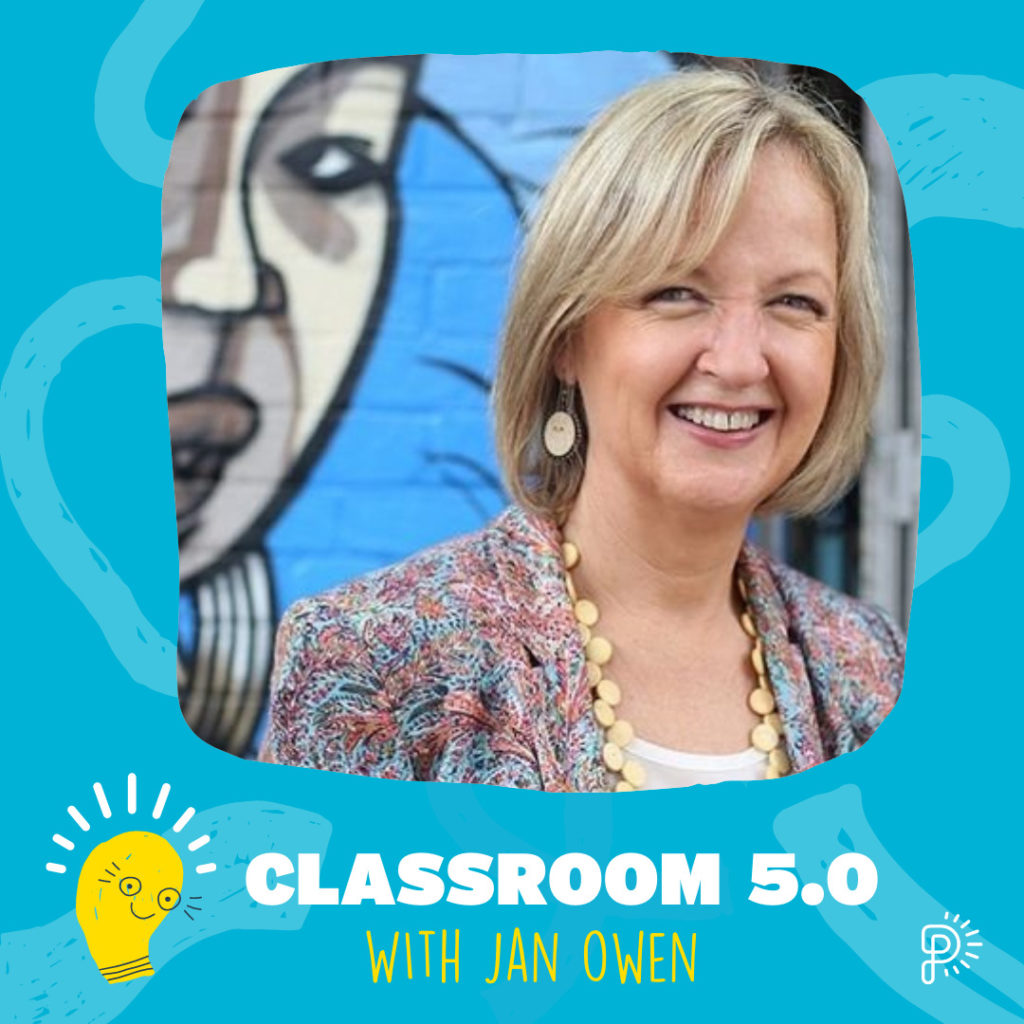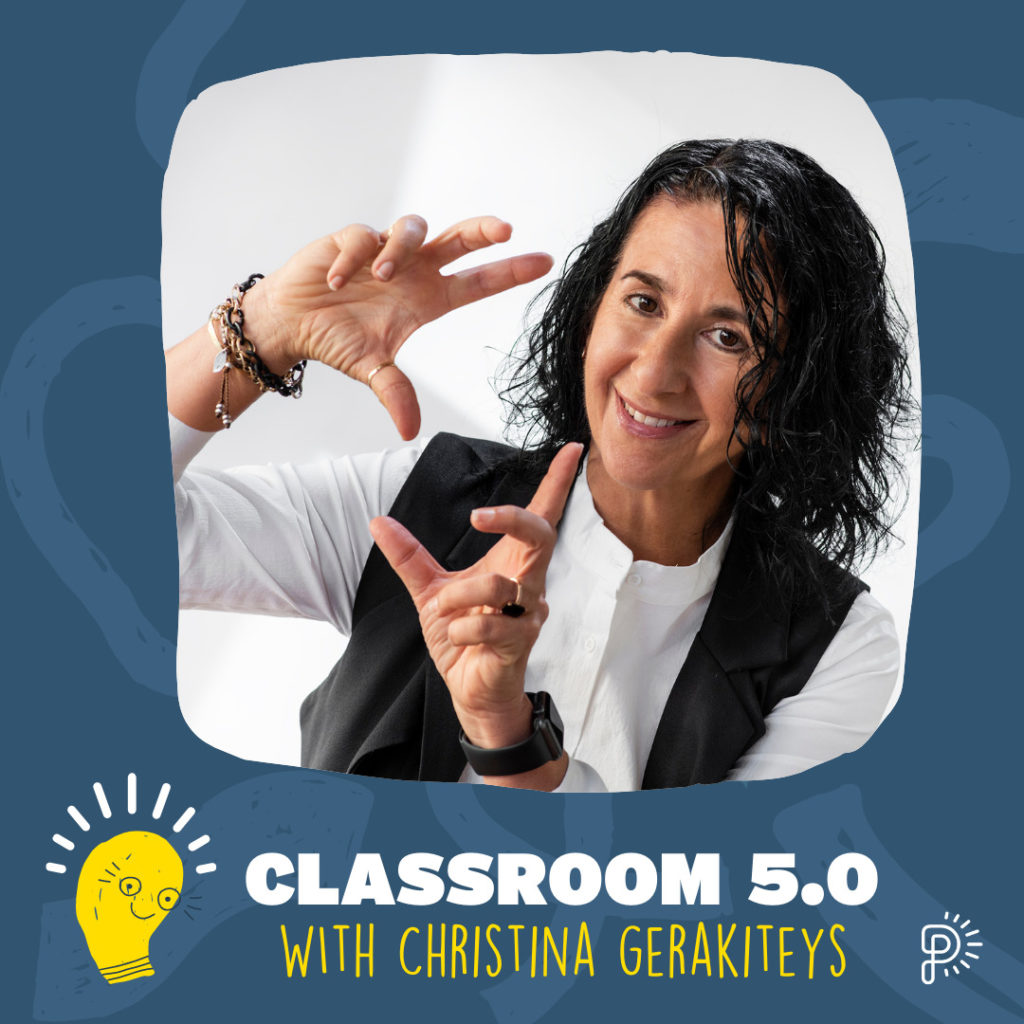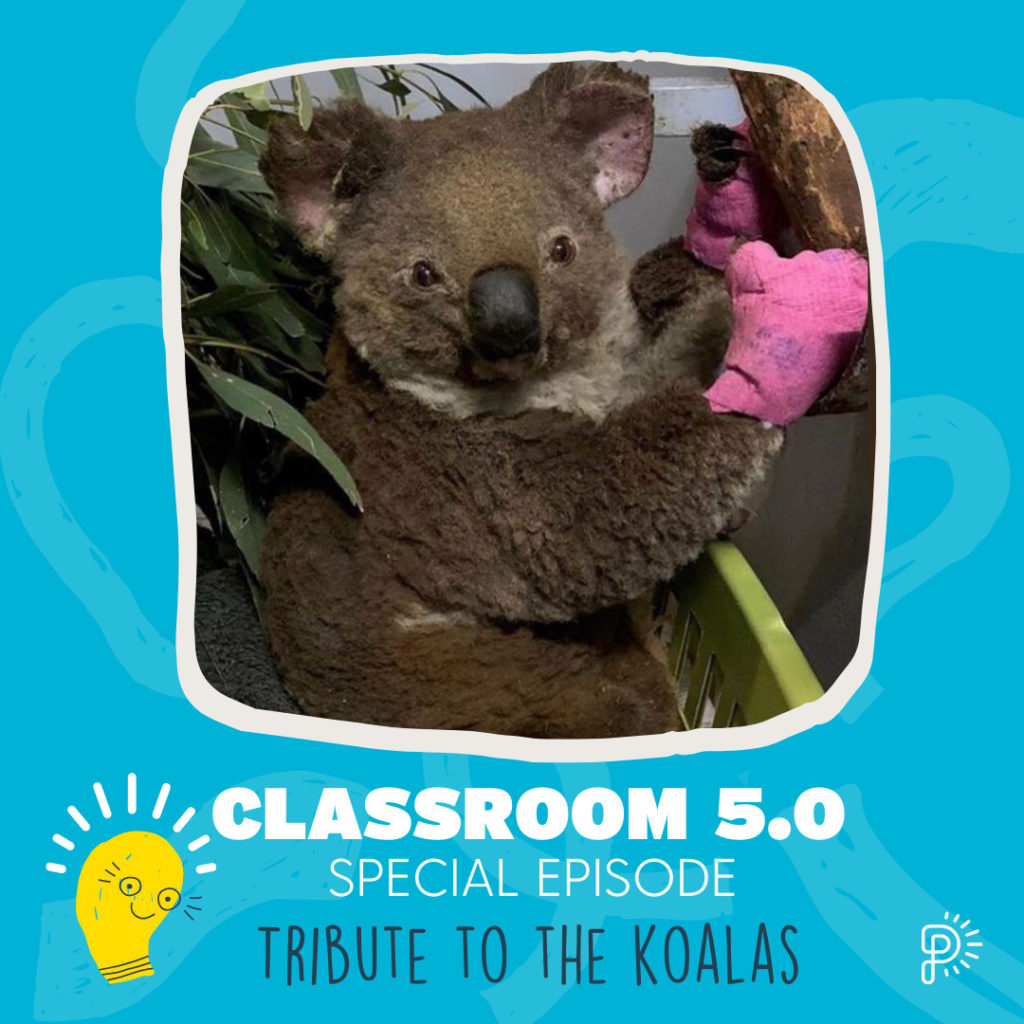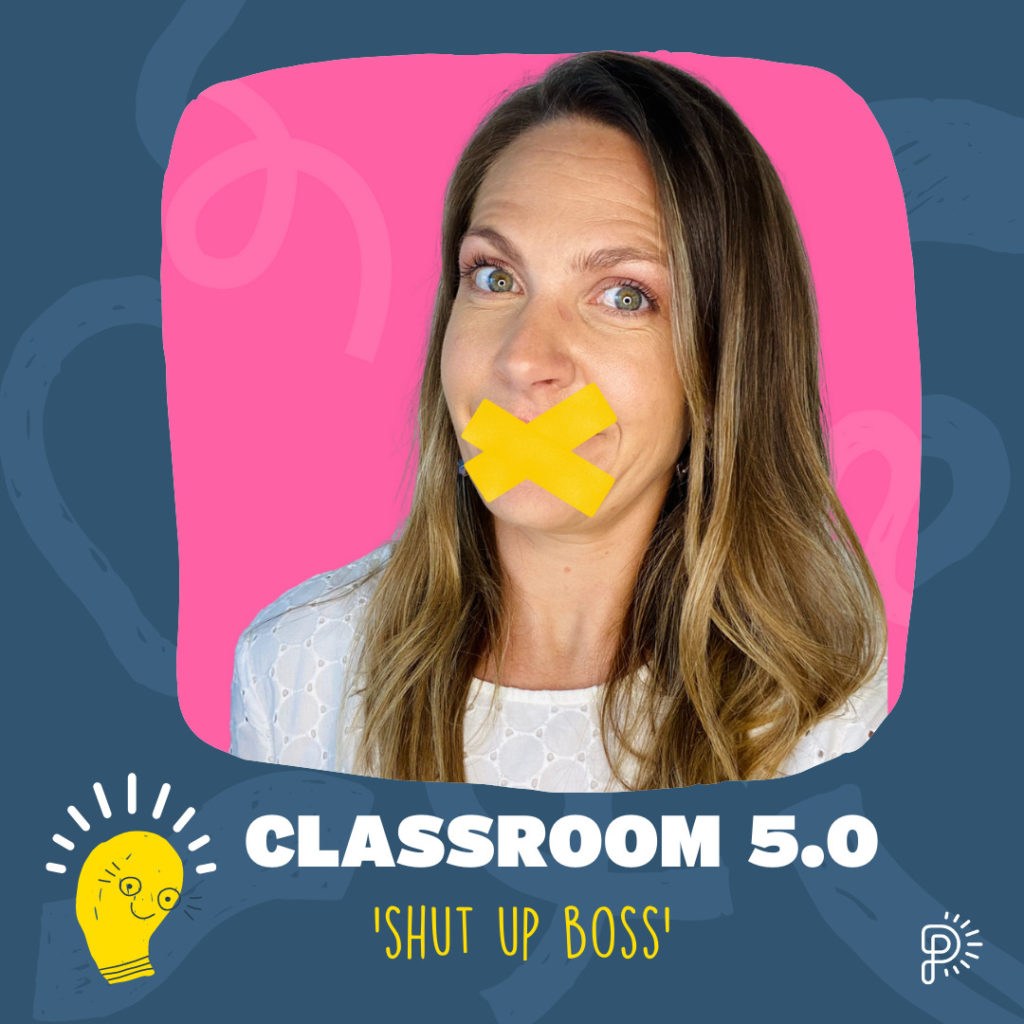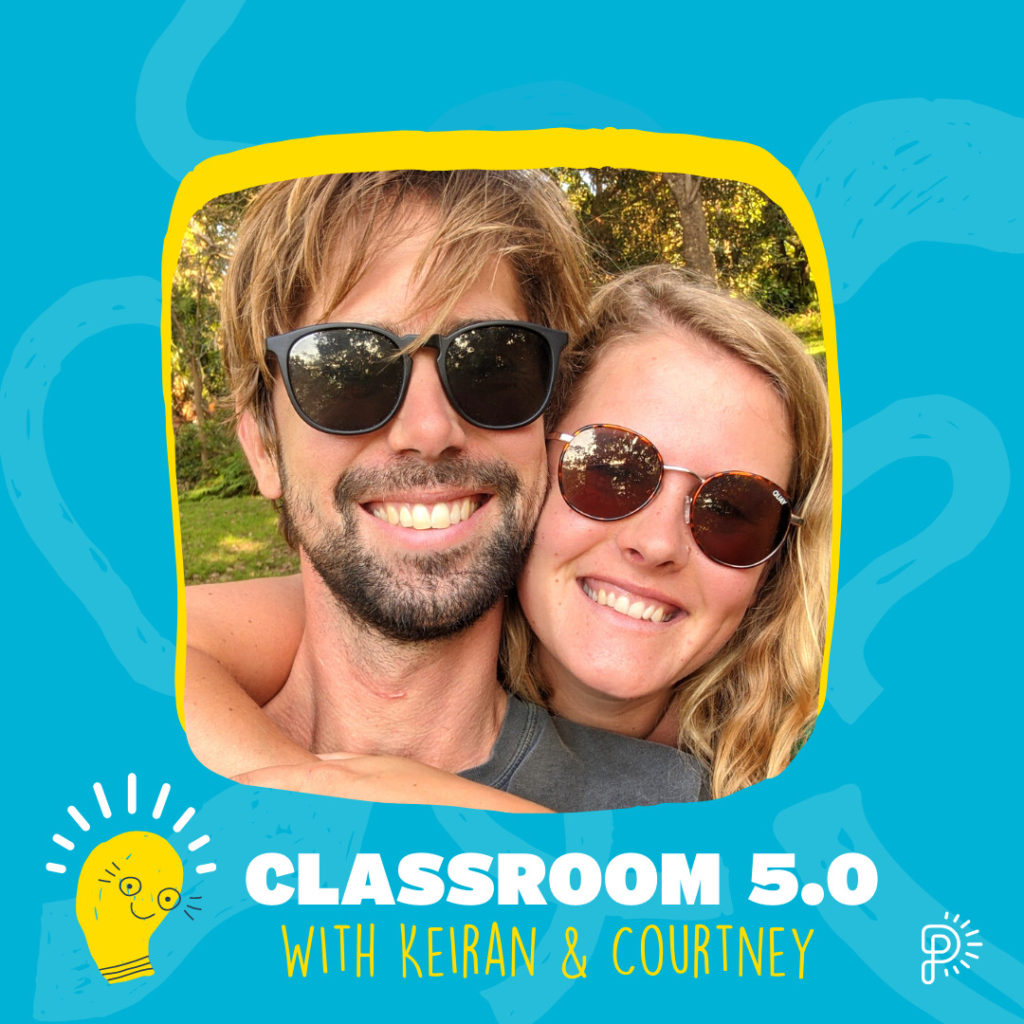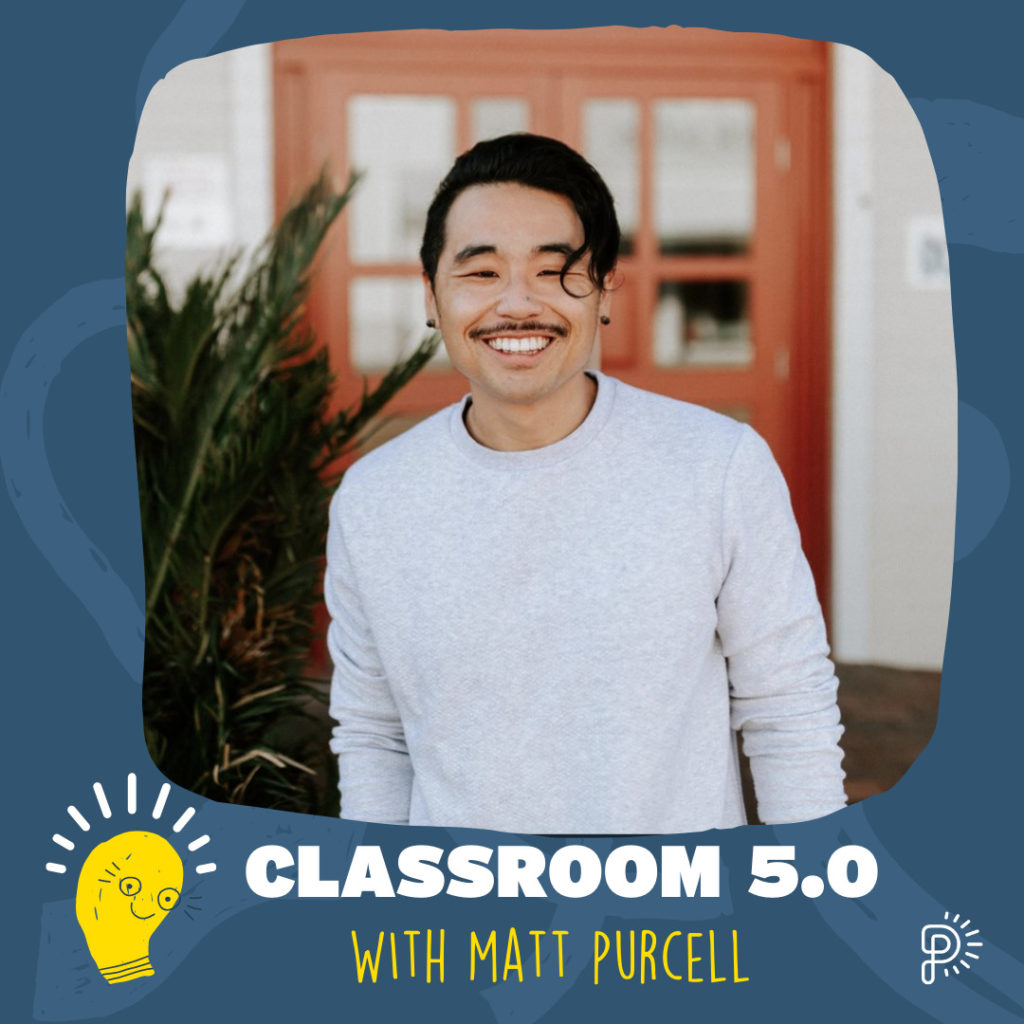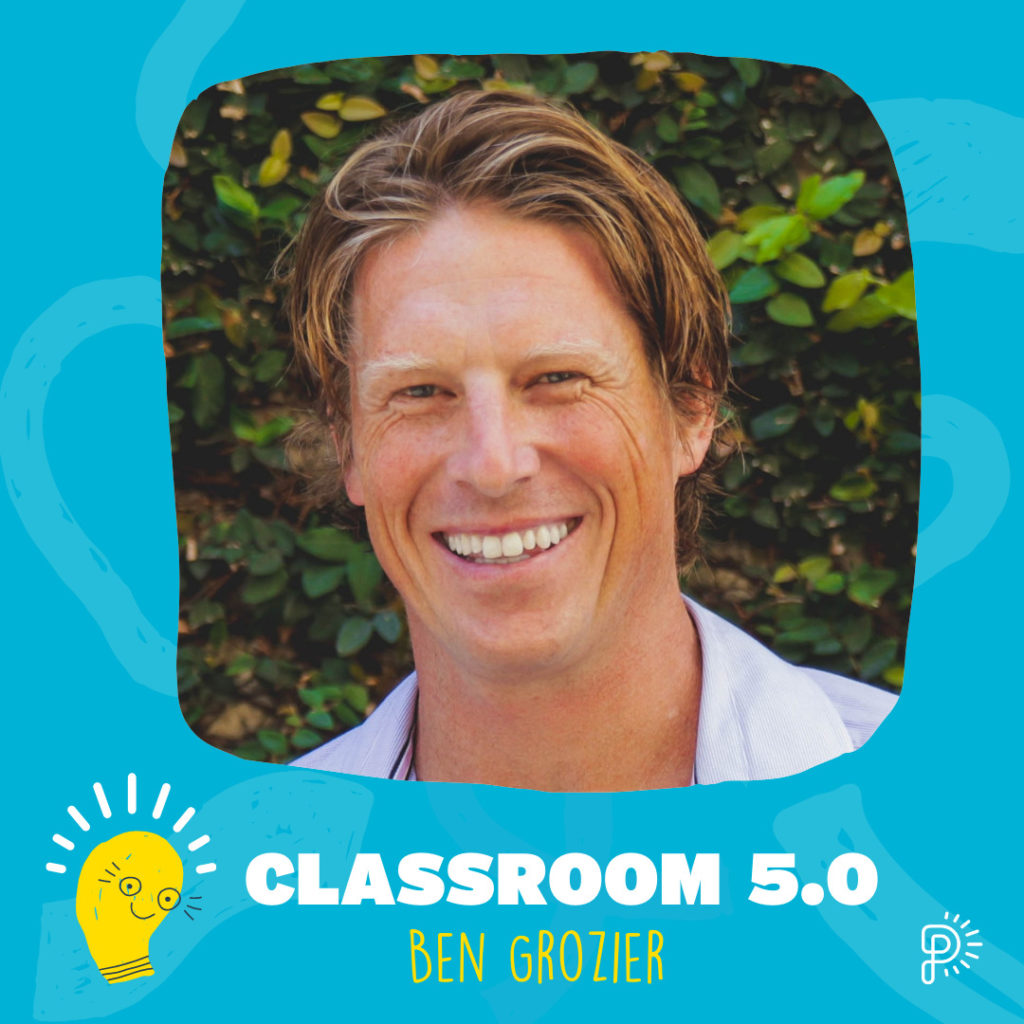CLASSROOM 5.0
THE FUTURE OF LEARNING
Episode 5: Christina Gerakiteys
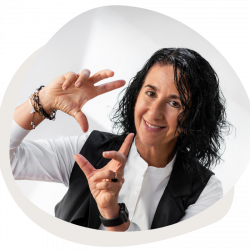
CLASSROOM 5.0
THE FUTURE OF LEARNING
Episode 5: Christina Gerakiteys
To the Moon and Back: Fostering the Unlimited Potential in Youth
WITH Christina Gerakiteys
Have you ever been struck by an idea so big and wild, that even your own mind struggled to comprehend it? An idea, that if you could magically remove any obstacles that might stop it from happening, could actually create the positive change we all want to see in the world? That’s the kind of idea our guest Christina Gerakiteys spends her days fostering, and in this episode, she shares how you can do the same to support imagination, play, curiosity and creativity with the young people in your life.
About Christina
As Co-CEO of SingularityU Australia and Founder of UtopiaX, Christina is a sought-after speaker, facilitator, and program designer, creating interactive educational experiences driven by design thinking, purpose, engagement, and play. The programs disrupt current mindsets to Moonshot thinking, exploring what is possible, rather than what is acceptable or limited. Christina has created highly customised programs for clients including Deloitte, IAG, Employment Hero and Entrepreneurs Organisation.
Christina is a catalyst for change, alchemising impossible to possible through the unleashing of human potential. Her purpose is to facilitate the road to a Utopic society, through the opening of hearts and minds, and her mission is to educate, empower and inspire leaders to converge transformational technologies to impact and solve humanity’s grand challenges.
Christina has presented key-notes and workshops at the Singularity University (online), Entrepreneurs Organisation (Global), Singularity University Leadership Forum (Palo Alto), SingularityU Australia Summit (Sydney), Vivid Ideas (Sydney), Creative Innovation (Melbourne), Inspiring Women Leaders Digital Conference (Madrid) and Front End Innovation Conference (Boston).
Christina writes for several publications, hosts the SingularityU Australia Webinar series A Future By Design, the podcast Inspire for 5, and speaks on radio about creativity and innovation. She is a contributor to the award-winning Front-End Innovation blog. A true mulit-potentialite, Christina is an advocate for innovation committees, produced the annual Hunter Innovation Festival, and lectures in Business, Innovation and Entrepreneurship. She is a lifelong learner, undertaking doctorate studies in Creativity and Innovation.
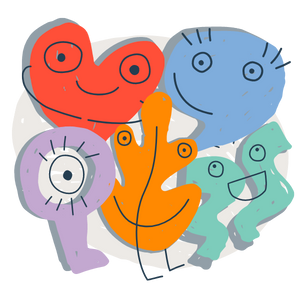
So I also believe that everybody is born with a unique mass transformative purpose, and if we're allowed to use that skill, in our employment, in whatever way that comes out, or in our communities, possibilities are endless.
~ CHRISTINA GERAKITEYS
Keen to take a deeper dive?
Find links to the resources and reads recommended in this episode:
- Watch the power of play in changing people’s rubbish related behaviour and habits
- and how Fun Theory (also known as Nudge Theory) promotes healthy habits here
- Read about Astro Teller and his concept of Moonshot Thinking
- Learn more about Singularity U Australia
- And Singularity University
- Download your free copy of our Impact: Into 2020 and Beyond (our research collaboration with Singularity U) from the bottom of our homepage
- Read Simon Sinek’s book, Start With Why
- Learn more about the Sustainable Development Goals
While we couldn’t find the Tasmanian study Christina referred to, there’s a plethora of research on the positive effects of positive psychology interventions applied within schools. This is often referred to as ‘positive education’. For example:
Mariane Power 0:00
Welcome to Classroom 5.0, a podcast that uncovers industry insights, cutting edge research and practical evidence based strategies that help us all to imagine and design learning environments and pathways for this ever evolving world so that together, we can best support the next gen to uncover and deliver their unique potential. This episode has been recorded from our hometown of Port Macquarie, which we’re grateful to share and enjoy alongside the traditional owners of Biripi country, whose ongoing cultures and connections to land and waters we celebrate, and whose elders past, present and emerging we pay our respect to.
Mariane Power 0:36
I’m Mariane Power co founder of the Posify group and your host for today’s episode, and I’m thrilled to be joined by Christina Gerakiteys, co-CEO for SingularityU Australia and founder of UtopiaX, and Christina is joining us today from her homeland and the land of Awabakal people. Christina is a sought after speaker, facilitator, and programme designer, creating interactive educational experiences driven by design thinking, purpose, engagement and play, that disrupt current mindsets to moonshot thinking, exploring what is possible rather than what’s acceptable or limited. Christina is an advocate for innovation committees, produced the annual Hunter Innovation Festival, and lectures in business, innovation, and entrepreneurship. She’s a lifelong learner contributing her discoveries as a writer to several publications, as well as the award-winning Front End Innovation blog. Christina is the host of SingularityU Australia webinars series A Future by Design, which I personally love, and the podcast is Five For Five, and is a frequent radio guest speaking on all things creativity and innovation, a topic she explored in depth in her doctorate studies and I’m sure we’ll explore today. Christina is on a mission to educate, empower, and inspire leaders to converge transformational technologies to impact and solve humanity’s grand challenges. In addition to a long list of keynote and workshop presentations, she’s created highly customised programmes for clients, including Entrepreneurs Organisation, IAG Employment Hero, and Deloitte. Christina truly is a catalyst for change, and describes her work as alkalizing impossible to possible through the unleashing of human potential. It’s no wonder I’m excited to see you here. Welcome, Christina, thank you so much for joining us.
Christina Gerakiteys 2:22
Thank you so much for inviting me on. I’m very excited. And I love the whole energy piece that you emit. So thank you for having me on.
Mariane Power 2:31
Oh, that’s very kind of you. Well, look it sounds like we’re both in good company. And we did start with quite the excitement bubbles. I can’t wait to share with everybody how you and I first met because it’s quite serendipitous within itself. But before we do, can I draw our attention or start our session with this concept of moonshot thinking because I feel like it’s going to set the scene for the podcast. For people who might not have heard of moonshot thinking or goals before, can you give us a little bit of a description and why they’re so important to you?
Christina Gerakiteys 3:00
I sure can. And in fact, I’ve actually been thinking that we need a different terminology now not just moonshot thinking, because not only have we been to the moon, but we’ve gone beyond the moon, we’ve landed on Mars twice.
Christina Gerakiteys 3:11
Essentially, we should call it intergalactic thinking or you know something like that. I’m not sure. But what it mean – it’s very much related to – Astro Teller was the one who first used it. He worked at Google or works at Google. And it was all about reaching beyond what you know is possible almost. So beyond the realism of possible. So when, when JFK went, we’re going to put a man on the moon. So we’d already landed spacecraft on the moon gone, gone into space, but we hadn’t landed a human on the moon. And he went, we’re gonna put a man on the moon and everyone went, are we? ( We’re gonna do what). Yeah, exactly. So it’s like you have the thought, and then you figure out how it’s gonna happen. And that is what moonshot thinking is. So moonshot thinking is, you don’t actually know how you’re going to do it. But you know, you want to do it, and you’re going to do it. It’s like when you know, Elon Musk is the king of moonshot thinking outside of Peter Diamandis, who’s one of the co founders of SingularityU. But Elon Musk sat in a traffic jam in LA and went, “Why can’t I just go down and shoot off?”, you know, and that’s how the Boring Group was initiated. So he decided that he was going to actually bore down and then create a tunnel that was going to take him at amazing speeds. Now the only problem with that is at the moment, they need to figure out how to fight gravity, because if they take off at the speeds they’ve got everyone’s going to end up with a broken neck. So that’s clearly not going to be any good. So they’re developing, they’re developing that but it’s very much like, what can I think of? And then how do I get there? So with converging technologies now that we have, we have the capacity to do so much and it’s how do we put all these things together? How do we converge minds? How do we converge the tech to make the impossible possible?
Mariane Power 4:55
I love that completely captures that and I also love that those examples that you gave for us. It’s the not stopping at the problem, isn’t it? It’s thinking towards the possible outcome and then starting, and facing things as they come. And it’s a beautiful segue into how you and I first met. Now I don’t know if you remember this, I’m going to take you down a little trip of memory lane along with our listeners. But the first time I came across your work and the work of SingularityU, I must admit, I was a late adopter. I was googling away finding out who was disruptive in the future of work and education leadership and came across your name. And was like, huh, there’s a summit happening. It looks amazing. And I’m not sure why because you told me that it’s not something that you would normally do. But your mobile number was attached. I thought, I’m gonna pick up the phone. So picked up the phone, you answered. And I think within less than 10 minutes, you said, “Look, I’ve got a lot to do. We’ve got three weeks, but I love the sound of this, let’s do some research, find out what’s going on at this summit!” And we went and for me, that still remains a highlight of my career back in 2019. And I know it will for days, because it was such a powerful reminder that when you take action that’s aligned with your purpose, and that is an example of moonshot thinking, I didn’t know how we were going to pull this off within three weeks. But we did. And we produced a beautiful research paper, we captured incredible insights that are still relevant today. And it was because you said yes. So that’s been really significant to me. And I wanted to share that with you and with our listeners as a perfect example.
Christina Gerakiteys 6:27
I want to say that had you not picked up the phone, I never would have had the opportunity to say yes. So I have this motto and I thought I made it up. But I didn’t. I went back and looked it up and someone’s been, like lots of people have been using it. But I have this – (Drat! You can have it though.) Don’t ask, don’t get. So if you don’t ask for something that you really want, then clearly you’re not going to get it. And I’ve got another example of that going back a few years that I would love to share with you and your listeners as well. But the story that I also want to share where I first discovered the power of don’t ask, don’t get. I ran a music festival with a group of students. And it was all about giving students an opportunity to learn by being immersed in the music industry. So they were music, business students, they weren’t performers. So we ran a week-long festival. So we had planned initially to run a one day festival, and someone said, why limit it to one day, why not make it a week and I went, why not? You’re on, we’re doing this thing for a week. (Oh wow!) I had, I had a student who had a very hard upbringing. And she was in this course and she was doing really well. She was a singer, or is a singer. And she said – so if you were in the course for two years, you got to organise a workshop. And you got to ask for whoever you wanted to come and run the workshop. So she came to me and she said I want to run the singing workshop. I said fine, you’re a singer let’s do it. Anyway, so she said to me, I really want to get Renee Geyer. Now some people remember who Renee Geyer is, some people may not know, but she is an Australian icon in the blue genre. (Yes, I’m already getting tingles) So this student said to me, I really want to get Renee Geyer and I went, well, what’s the problem? She said, well the rest of the class laughed at me because they don’t think I’ve got any chance of getting her. I said, well if you stand here right now and you say to me, I’m not even going to ask Renee Geyer even though she’s the one I really want, what chance have you got? And she looked at me and went, well none. I went, and if you ask her, what do you change? It’s 50/50. So we played this math game. And she’s looking at me like I’m crazy. And originally I said, if you ask her, and you don’t get her, what have you lost? And she said, we’ll probably four hours of research because I know that’s what you’re going to make me do to find out what language she uses, how to get in contact with her, blah blah blah. And I said, right, so you’ve lost four hours of your life finding out about somebody who you really admire. Is that such a loss? No. Okay, well, let’s get to it. Cut a long story short, she got Renee Geyer, who ran the best singing workshop I’ve ever been to. And I can say that because I used to sing in a band as well. Best singing workshop I have ever been to. Not only that, but she mentored her for 12 months. (Wow!) So, yeah exactly! Had she not asked, she never would have got it. And so I’ve lived by this idea of don’t ask, don’t get and it’s taken me to remarkable areas and allowed me to interview the most amazing people. And it’s also, it’s taken me to, like, I’m a regular guest at the Boston Innovation Festival, or at least I was when we could travel. And that’s because I asked, you know, and I’ve run workshops for them. And I’ve been a keynote speaker and things like that, but that’s because I went out there and I asked, and I’ve made the most amazing contacts. I’ve run workshops with Simon Sinek Start With Why team, because I went out there and asked, you know, so there’s a whole lot of serendipity involved. There’s a whole lot of, you know, I’m not sure whether I believe in the luck theory, I believe if you place yourself in as many opportune places as you can. Something’s got to come off somewhere. And you know, maybe there is an element of luck in that, I’m not sure. But if you don’t even ask, I know that you don’t get.
Mariane Power 10:10
Absolutely. And you know, as you’re talking, the word purpose just keeps coming back to mind. And those examples and the ones we shared earlier, being aligned to I mean, you call it a massive transformational transformative purpose is that right? And the importance of having that and, and, and then taking action towards it, it’s no good just having the insight, or having the idea, or having the vision, it’s taking that aligned action as well. So if we can go to that, because I’m curious in your work with adults, and how you encourage them to first establish this massive transformative purpose, how you’re seeing that as being really helpful to adults, but then how we can also start to weave this in for young people as well, and why we might start earlier, but if I can start with yours, because it’s just beautiful. So Christina’s purpose, I quote, is “to facilitate the road to a utopian society through the opening of hearts and minds.” Wow. That’s gotta lead to some yes moments, I would imagine when you share that, but you tell me more. Sell me purpose.
Christina Gerakiteys 11:11
And part of that whole philosophy is, so every time we take on a new project, or we have a new opportunity, I go will this enable the enablers because it’s only by enabling enablers that you are going to be able to open as many hearts and minds to opportunity, to possibility, as possible. And I totally believe, like, it’s so easy for us to believe in the fear, especially right now, with everything that’s going on in the world. It’s so easy for us to tip into fear, and hate, and anger. And if we believe equally in those things, then we must believe – because according to Newton, everything has an opposite and equal reaction. And everything’s based in science, like science, for me is something that, that observes what’s going on in the world, creates a hypothesis and then goes about and proves it, right. So everything has an equal and opposite reaction, we know that there is a reaction in fear, and we can easily step into fear. And it’s the birth of conspiracy theories and a whole lot of other fear factors. And if we believe in that, then we equally must believe in the power of love. And we’ve all experienced that power of love. You know, when you hold your child or someone else’s child, or you you you’re embraced by a parent, or you meet your your soulmate, or your partner, or you know, your bestie, there’s this amazing sense of love or animals because they love unconditionally, you know, so we know what that love is, at this intimate level, we question whether we can use it at a global level. If we use it at an intimate level, we can use it at a global level, we have to, for me, break through the belief that good is not as powerful as evil, maybe or fear. And evil, I don’t like using the word evil, because evil is a judgement. And in a world of unconditional love. You don’t judge, you know, and this is probably the biggest, lifelong experiment that I could ever have embarked on. And let me tell you, your family are the ones that push most of the buttons. But you, so it’s a, it’s a whole series of things. But for me, it is about unconditional love. And it is about, it is about enabling people, and how did I come to that? And how did I come to know that I’m on purpose and on target now? It had a lot to do with the workshops that we wrote for, according to Simon Sinek Start With Why, I’ve got to say, I haven’t worked with Simon unfortunately, I’ve worked with Peter Dhaka, his right hand man in Europe, who is an amazing human, we wrote a workshop on finding your why, finding your purpose. And it’s really a discovery of every single thing that you’ve loved. Every event that has either happened that has made you feel elated, or made you feel depressed or low or kicked you in the guts or whatever that was, and it’s a, it’s an amalgamation of everything that you’ve learned of all the life changing experiences that you’ve had above the line or below the line, so good or bad. And it’s a gathering of all those things, to land you to where you are at the present time in your life when you start doing the discovery. So I’ll just quickly share with you that I’ve had multiple careers right I’ve worked in television, I started off in law, I’ve, and some of these were pretty short careers. I’ve worked as a herbalist, I’ve worked in education, I’ve written curriculum, blah, blah, blah, blah, blah. And I look back at – I’ve you know, I’ve been in a band, I’ve been in plays, I’ve performed on stage, der, all that kind of stuff, and I go, how does all that fit into where I want to be now, and if I look at it – I used to be really annoyed with myself because I’d go next time I get into something I’m just going to do that and I’m not gonna veer off the path and I’m, you know, because I had this envy for people who want to be a doctor and that’s all they, you know, they just went down that path. (The linear path). Oh my god and, so focused and I go, I’m so scattered. At the end, I had a conversation with a gentleman by the name of Jeff Julian, who’s worked for Steve Jobs. And he’s worked for a number of Hollywood directors, including Spielberg. And he’s, you know, he created some of the backgrounds in the latest Loki series on on Disney Channel. He’s done the most remarkable work anyway, I had a conversation with him, and I said, “Why did Steve Jobs hire you?”. And he went, “Funny you should ask that.” He said, “I asked Steve that over coffee.” and I went great you have every place of work that I ever want on my CV. Can I borrow some of them? And you’ve had coffee with Steve Jobs? He said, “Yeah, yeah,yeah” he said, I asked Steve why he hired me. And he said, Steve Jobs hired him, because he knew a fair bit about a lot of stuff. And I went, Oh, my goodness. I know a fair bit about a lot of stuff. I don’t know everything about everything. But I know a fair bit about alot of stuff (An expert generalist). A generalist, or a polymath. So I really like polymath (Oh I like that. Multi-potentialized.) And I went, oh my God, I think I’ve come home. And then I went, well, all the performance and the things like that, and the performance stuff has held me in great stead on stage, you know, I’ve been able to use breathing techniques and connection techniques, and you know, how to calm those nerves, techniques and things like that. So if you want to come to what your purpose is, it’s a bit of a journey, and it can really bring up some stuff, you know, for one of a more intelligent, academic, word. But it can bring up a whole lot of stuff that’s been suppressed. But once you realise it, everything there has some guidance to you. And that’s not saying that you wish you’d experienced it, or to be, you know, to go where you are. But, you know, I know that bliss exists, because I’ve, I’ve experienced it, I know that lifelong transformation exists, because I’ve experienced it. And if I’ve experienced it, other people can experience it. And if I really want to create this change in the world, then that’s where I need to try and take people when they’re ready of course, not just because I want to take them and it’s not the only path to get there. But if I can influence the people that are in my sphere, to help them have those transformational changes, if I can facilitate those, because you don’t cause anything for anybody, you just give opportunity, you know, and people take them or they don’t, or they find different opportunities. You know, again, there’s no judgement, no expectation, but I know it happened to me. And if I can facilitate that for someone else, then that’s my purpose to opening hearts and minds to knowing that anything is possible.
Mariane Power 17:43
Hey there, I wanted to tell you about an exciting and innovative solution we’ve been designing to help solve this problem of how we best prepare the next gen for an ever evolving world and future workforce that’s going to demand a whole new set of skills and mindsets in order for them to thrive. The Posify Academy is Australia’s first student led, evidence based, and curriculum aligned, wellbeing and career development platform, helping young people aged 10 to 14, uncover and deliver their unique potential. It’s the first of a trilogy series that’s helping young people move seamlessly and with confidence from education and into industry as they design a life and a career of impact. Teaching skills like communication, compassion, creativity, critical thinking, agility, curiosity, resilience, problem solving, all those human capability skills that we talk about here on this podcast, and connecting them with a sense of purpose. To learn more, you can visit theposifygroup.com.au/posify-academy. Now back to the show!
Mariane Power 18:44
I have to giggle because I was hearing you say it’s not the sciency word, the stuff. But as you were speaking, I mean, my mind in terms of the science of what makes for meaning was coming to mind with everything you were saying. So I know you and I were speaking recently about the work of researchers, Metalor, and Steger. And they’ve really come up with an evidence-informed theory around, you know, what does make for a meaningful life. And it’s those three dimensions. So it’s knowing what sits on your heart. So all those beautiful values, and relationships, and bliss, and transformation, and joy that you were mentioning. So that’s the significance bit. The coherence, and that’s the storytelling aspect, I’m hearing you say that you have worked on yourself, but also working with others. It’s making sense of well, how do all of these map meaningfully to my life, you know, what’s my experience? And how do I tie all these experiences together in a way that’s meaningful? And then of course, purpose, which is the goal oriented bit that we’re getting to, that I’ve heard you articulate so beautifully. And so I mean, for us in terms of working with kids, it just makes sense that we would start that journey of starting to notice these things of what maps to my heart, and to my story, and then what can I make of that in terms of an action oriented goal, to keep a record. So it sounds like that would be helpful as an adult, for the adults that you’ve been working with as well.
Christina Gerakiteys 19:58
So if we look in the spiritual realm, there’s a sense that up until the age of seven, we have a bit of ourselves in the ether and we have a bit of ourselves on planet earth as we get older and we have more experiences we kind of land, land more on earth. And if you think about who we are, we’re, you know, what we’re made of, we made up of energy, you know, we are these vibrational atoms of energy. So theoretically, we should be able to, to, you know, I should be able to put my hand through that screen and almost touch you because everything’s just vibrational energy. And that’s been proven by a multitude of scientists, and physicists, and engineer’s. So there’s a certain point, I believe, where we need to say, “Hey, we need to open people up to experiences.” And we shouldn’t be closing kids off, you know, to say to a child, that you can’t play dress ups, because you’ve got to come and learn how to write your name before you get to kindergarten is like criminal for me. Okay, so well it’s not criminal, that’s a judgement as well. It’s just maybe not the way, that’s not the path I chose for my children. And that imaginative play, and that role playing, we learn so much about where we want to fit in society and about ourselves. And, you know, I always wanted to be the, the, the cowgirl – not the cow girl – the Indian girl in the cowboys and Indian films, you know, that that sort of thing. So what does that say about me? I am so closely tied to Indigenous cultures. (Yeah). And that for me is, you know, it kind of sits in – why didn’t I want to be the cowgirl or the cowboy? I don’t know, I had this wanting to be this Indian. So I think when kids are really young, we need to open their minds up to as many experiences as possible, take them to the park, take them for a walk down the street. I remember taking my four year old godson for a walk down the street. And all he said was why? Why? What’s that? Why? Why? Why? And I went my god, this is the most exhausting walk I’ve ever had!
Mariane Power 21:57
Wouldn’t it be beautiful if that curiosity and that “Why, why, why”. We saw it because we see it, we, it kind of, it goes, doesn’t it, as they get a little bit older, and oh gosh.
Christina Gerakiteys 22:06
And if we can keep that (Keep it!) So as we go through school, if we can keep that and foster that curiosity, that’s where learning needs to go. Because that’s where you find out.
Mariane Power 22:16
Yeah, yeah, no, I just see why there’s like minds here. And I also loved the idea that, as you were speaking, that we’re starting to see the convergence of sciences and spirituality and quantum physics and all these disciplines come together to explore some of the things that, and to your point of science being you know, hypothesis testing observation, I’ll add to that, that really it’s not science unless there’s a falsifiability attached to it. So it’s that, it is that curiosity mindset of, you know, what’s next, what’s next. So we understand this much. But what’s next, we’re always willing to question ourselves, and, and to actually disprove our theories. And that’s why I love science as well. But speaking to this point of keeping curiosity, open mindedness in children, what we’ve noticed, and what we hear educators who might be listening today, or parents, I guess, complaining, if that’s the right word, about is that when it comes to some of those older, getting into the teenage years, there’s just such a lot of problem happening in the world. And the focus on the crisis, that the climate crisis that’s happening and these global economic and social and political fractures, and it’s very distressing, the mental health crisis that young people are facing. And what the adults we’re speaking to are noticing is, is sometimes leading to some limited and some rigid thinking. And so we’re playing around with what it looks like to intentionally teach strength-based and solution-focused language. What I love about SingularityU is this reframing of global challenges and looking at opportunities. And I wonder if I can throw over to you a little bit about what Singularity is doing in terms of global challenges, and then how that relates to the future of work?
Christina Gerakiteys 23:52
Sure, so global challenges, everything we do has social impact. The organisations that we work with are looking for their purpose, their social impact, or they’re already living it and spreading it. So we have, we have an alignment with the Sustainable Development Goals, with the environment sustainable development goals, we have an alignment with the Global Grand Challenges, which we divided into social and resources. So basically, what we want to do, as a species, as sentient beings is, cradle every soul, cradle every human and go, here’s an opportunity for you to reach wherever it is that you want to go. So if everybody was to have a level playing field, and if you go through the SDGs, or the global –
Mariane Power 24:40
Yeah I’m just thinking even some of our listeners might not be familiar with the SDGs. So what are they for people who are unaware of them?
Christina Gerakiteys 24:46
So the United Nations sat down and wrote, what are the Sustainable Development Goals? What are the things that we need to achieve around climate, around poverty, around homelessness, around shelter, around health, around education, so there are 17 please look them up. There’ll be many that align to how you feel about your place in the planet as well and which ones you want to, you want to work towards. We’re very much a social impact, social bottom line, have a passion and a purpose. I don’t believe that organisations, businesses, corporations will exist in the next 15 years, 10 to 15 years unless they have that social purpose we are starting. And I think the pandemic time absolutely accelerated everybody into, what is the future of work? What is it that we really want? How are we looking after each other? You know are we looking after each other, and what does all that mean? And it also accelerated a lot of change. So it accelerated a lot of change around health and education, how we use online, the convergence of technology, the collaboration, that is now happening, I mean, we saw that in the development of the vaccines, people were sharing information, people were – we couldn’t get to a, to a vaccine fast enough. The trials were, you know, how trials were conducted. (Yeah), and amount of red tape that was cut through
Mariane Power 26:04
Amazing. And it’s that spirit of collaboration, isn’t it. And as you’re talking, and I know, I 100% sit with you in that respect for teachers. Wow. Hats off, especially at the moment. And the other thing I want to draw in bringing all that together is systems thinking. And its importance in terms of moving forward for design, and particularly to your point of that we are now moving into this era of automation. And I know at SingularityU, you talk a lot about, let’s work towards solutions. So rather than saying problems, let’s talk about challenges. And then design solutions using what we have as our human capital. And then exponential technologies to make this happen. But I’m curious for for our educators who are feeling perhaps a little under respected, hopefully more respected, maybe under resourced, hopefully better resourced off the back of this, can you help us in understanding what the future of work, in terms of automation, looks like for the next gen and how we can best prepare them, from your perspective and what you’re seeing?
Christina Gerakiteys 27:06
So I think if we have an expectation, then that’s not the right thing to do.(Okay) I think what we really need, because we don’t know, if you had said 20 years ago that (Yeah) all my life was going to be contained on a phone that I could email, take photos, listen to my music, have a look at the weather, play a mind game, keep myself up to date, watch my health, you know, through one phone, people would have laughed at you. And the talk is out there right now. It’s about skills that we develop.
Mariane Power 27:36
Yeah. And what are they like practically speaking? What do you see them as?
Christina Gerakiteys 27:40
Curiosity. Big one. So do not squash curiosity. Do not box children in. I know that sounds like a command, and maybe it is from my like, I’m just going to unbox anyone. (Foster curiosity. Yeah, yeah.) I’ve lectured in entrepreneurship at university. And I have seen the results of – so we’ll have these open tuts, and everyone will be expansive, and they’ll be curious, and they’ll be asking questions, and they’ll be creating. And as soon as it gets to an assessment task, what does that word mean? What does that, what does that mean? What do you mean by that phrase? What am I supposed to answer? And then I look at some of the questions that have been set by certain organisations and I go, this is an entrepreneur class assessment task, (Thinking big, is needed?) Yeah, think – like why is there, in order to get an A, you will do this, you will do that you. So we find that instead of letting the imagination go and (Which is necessary for innovation and creativity. Yeah.) So it’s that curiosity, don’t box people, and this is from a young age,meditation, (Meditation) mindfulness, (Mindfulness). So let me, let me tell you about an experiment that was done in Tasmania. And I’ve for the life of me, I can’t find the original paper because I read it many years ago. And then I just went, I really need to dig that out. So if any of the listeners (We’ll have to go hunting together! And if we find it we’ll put it in the show notes. Okay, good) But there was a, there was a study done and they used two first classes at the same school. So same socio-economic environment, etc. in a school in Tasmania, two first classes. One of the classes they took outside every morning, they could hug a tree or talk to a tree, you know, as crazy as that sounds. It’s also very beautiful, because who doesn’t go in nature and just put thoughts out there. So they would adopt a tree, talk to the tree, if they were feeling sad, angry, whatever they would, you know, share it with a tree. They would meditate in class, so they would start the day with a meditation, they would massage each other once a day. So I don’t know how we’d go with that with some of the issues that are going on in schools. But you know, there was this daily massage routine. There was a fostering of collaboration and communication. There was also a visit to an old people’s home once a week, where they would then massage the elderly in those homes, and be company and talk, etc. So one class had all of those experiences those very human, humane, emotional –
Mariane Power 30:16
I’m thinking, sort of more maps to traditional Eastern principles, which we’re now seeing moved across into Western science. But really they’re human, aren’t they? (Yeah, they are indeed). So compassion, self compassion, empathy, touch. Yeah.
Christina Gerakiteys 30:30
And, and how you know, all that makes you feel much more confident in yourself. We know through, through science, that we feel better that we release all these hormones, when we’re in giving mode, as well. So we’re releasing all these hormones as we’re making someone else feel better. (Power of purpose, absolutely) It’s intrinsic to our nature. But you know, somewhere along the line, something happens. Anyway, at the end –
Mariane Power 30:50
So what happened? What was the, yeah, the outcome?
Christina Gerakiteys 30:53
It’s a no-brainer to say that the class that did the meditation, the sharing the giving, actually did better academically, than the other class who focused purely on the academics. So if that’s not evidence for all round education, and the things that we do need to foster in the young, or and in everybody, like there’s no, there’s no stopping it, actually. So curiosity, the opportunity to shine your skill. So I also believe that everybody is born with a unique mass transformative purpose, purpose, and if we’re allowed to use that skill, in our employment, in whatever way that comes out, or in our communities, you know, some people don’t want to use it at work, they’ll, they’ll go out and they’ll volunteer in community. If we’re allowed to use that and find our place and gain that self confidence, self worth, self esteem, buy into that purpose. And I also believe that meditation, mindfulness, yoga, all those abilities are also on an exponential, upward trend at the moment, because if we’re going to learn to live with exponential changing tech, the way it’s going, we also need to live in the present moment, because the only way we’re going to deal with the rise in the changing tech and the constant. I’ve been saying, you know, we’re not pivoting anymore, we’re pirouetting. (Kinda getting a little dizzy over here!). But if you don’t have that, that mindfulness to live in the present, and to self regulate (To co-regulate) and not get overwhelmed (Yeah). So I think there’s a absolute reason why it’s happening like this, at the moment, and there’s more people doing, have a look around you, more people are doing yoga and meditation or mindfulness or, you know, nutrition, I’m, whenever did we think that whatever we put in, didn’t create every cell in our body and was responsible for how we were reacting outwards, you know, feed your body coke and sweets. And,
Mariane Power 32:52
Yeah, and it’s exactly why, I mean, I’m, obviously my trainings in clinical psychology, where I love meaning and purpose is that it converges then, between what we know as clinical psychology or I guess, dysfunction, and even that’s getting a reworking these days as we move through these times, but then what we call positive psychology. And I’m loving that so many more people are accepting without having to argue like we’re used to, that taking prevention and action towards our own, not only physical health, but psychological and spiritual health is just going to be so fundamental for us all as we’re moving through and to be able to help young people through that process for us is such a privilege. Oh, my goodness, Christina, I could talk to you for hours. I’m curious, back to what we’re doing here for the podcast, which is designing future learning spaces. I have another question before we get to a game which I really want to do with you. I’m super excited because I know it’s going to be fun. Yeah, can’t contain. But in terms of designing future learning spaces, and I heard you say we don’t want to be bouncing too far, because who know what we’re facing. But I’m even thinking next year, tomorrow, when we get back in classrooms. (Yeah) What would you like to see us as educators, as parents, as adults, as industry, providing for our young people so that they can learn, explore, be curious, play with their strengths.
Christina Gerakiteys 34:09
So opportunities to be all those things, and I heard of a school or actually, I didn’t hear of a school, I was talking to the headmistress from a school in Melbourne, and what they did, and this was quite a few years ago now as well, but what they did was they had because we’ve got cross generational workplaces now, and because we can work from anywhere, and because there are opportunities, people are, particularly people coming into the workforce now, very selective with where they want to go and work, you know, if they’re, if they’re a real climate activist, they’re not going to go and work for an organisation that is harming the environment in any way, shape, or form. We’re spending money according to our purpose, and according to the principles, and the morals, and the ethics, you know, that we want to live by. So at this school, what they did was, you know, five school days and they had one school day where they were based on academic level of achievement. So you know you did Year 7 reading, writing arithmetic, science, etc. Year 8 up to, and they’d only did this from Year 7 to 10. So Year 11 and 12 were clearly focused on the, on the HSC (Structure, yeah) So 7 to 10, one day a week was very much on that purposed academic, very much curriculum strict. (Yeah) For two days, they put all that to practice but they put it into a project-based practice that was based on their age interests. (Yeah) So if you were in Year 7, you got to work on a space project, or a garden project or a, you know, a building, whatever that project was, where you brought those curiosity skills, the reading, writing, and arithmetic science. So everything was taught. So if you were doing a farm experiment, it was what’s the biology of the plant, then what do you know, so everything was related to the project. But it was age based. For two days of the week, they also did purpose driven. So I don’t think they actually called it purpose driven, but they got to pick a project. But Years 7 to 10 worked together. So you had that curious, curiosity, and that, you know that, I don’t know so much but my imaginations a bit wilder, of the Year 7, with a Year 10 who went, yeah but I’ve already learned this in physics, maths, chemistry, whatever. And those, those knowledge bases converged. So everything was project based, (Wow) I can imagine how much work it was. I think we need to, we need to get rid of so much of that reporting, and red tape, and everything that you know, a teacher’s life at the moment is spent, (It’s so hard) filling in, filling in reports, making sure the curriculums covered, not making any you know, it’s just, they’ve been talking about rewriting education forever, as we both know. Just do it! Like, just get on with it! (Just say yes! Moonshot thinking!) Just do it, anyway. Or give people the option. You know, there’s a really good, so there’s a school. So I’m based in Newcastle, there’s a school here. And if you’re not doing so well, in mainstream, and you’re being a bit disruptive, they send you to this alternative school, yeah, where you can do your HSC based on on a project of interest. So my daughter had had a friend who was just not mainstream school, she ended up going to this school, she did her HSC, what she had to do was present a whole project, a two year worth research project. And she did it on yoga, right? So the whole meditation part, the physical, what happened to the body, the anatomy, the the mental, every component of yoga, she included in this two year study that was her project that matriculated her, okay, because we have this thing that you have to matriculate. And that’s another argument right now about the validity of a university education. But that might be a conversation for another day –
Mariane Power 37:59
It sounds like the big dream project, I think, is what you’re referring to, I’ll double check and I’ll pop it in our show notes for anyone who’s interested in following it up.
Christina Gerakiteys 38:07
Well, she’s now studying physiotherapy at university based on this yoga project. So she was totally immersed in that, it was project based, it was something that she was inspired by. And you know, even I know another young person who basically failed the HSC, who’s getting HD’s now that they’re studying Forensic Psychology at university.
Mariane Power 38:28
And it’s just point to I mean, we talk about you with career design, it’s way finding. No, there’s no longer linear pathways. And as we’ve faced this period of time, I think where our traditional methods of assessing and entrance into career pathways, they’re disappearing and it’s time to reimagine what they look like. So thank you for all of those inspiring ideas.
Christina Gerakiteys 38:48
Can I add one more (Go for it). I think EQ is equally as important and you alluded to it before you like you basically said it before that empathy. You need to be an empath you can’t just be, intelligence is something I mean, everything can be learned. You can change your behaviours by different experiences. But I think that whole resilience, persistence, curiosity, (absolutely) empathy. Finding your niche, finding where it is that you want to sit in the world, is so important, and I think they all need to be written in and it can all happen through project based learning and it can also happen through you know, your project could have an amazing outcome that does social good from the very beginning. You know, go and sell, create lemonade stands like they used to, learn how to be an entrepreneur, learn the goodness that can go into you know, learn how to make lemonade, learn the physics and the chemistry behind making lemonade, and then donate the money to your favourite charity like –
Mariane Power 39:41
Yeah, and what I liked about your example before is that for anybody who’s sitting here, feeling anxious because we can’t throw those explicit teachings out. Of course, we need literacy skills and numeracy skills and all those fundamentals. And what I loved about your idea before is how might we start to – which leads into our game! I’m getting too far ahead of myself! But how might we start to design our learning spaces that make room and space for both, and give our teachers and our educators and our parents a space to dream and imagine and design so I think you’ve given so many good ideas and it’s interesting because we speak to industry too and they’re saying the same it’s not just IQ anymore it’s the three parts to make a whole human, so it’s intellectual IQ, it’s EQ so your emotional intelligence, but it’s also the adaptability accordion so how quickly can I to your point, pirouet, and and change with resilience to my changing circumstances so I know our listeners are going to go “I’ve just found so many gold nuggets” and I’ll be sure to put links to everything we’ve covered including the SDGs, the work that Christina is doing at SingU as well, and how you can get more information there and I’m going to try and track down that paper if you find it before I do definitely definitely sing out.
Mariane Power 40:53
Game time, are you ready? I feel like I’ve talked this up.
Christina Gerakiteys 40:58
I’m game! Okay let’s go!
Mariane Power 40:59
Well the thing is from my perspective of all people to play a game with you’ve got to be up there and you know I’ve played some good games with some good humans so I’m excited no pressure of course.
Christina Gerakiteys 41:09
Okay no pressure. I hope I perform.
Mariane Power 41:14
All right, so it goes back to, I did allude to it, the ‘How might we’ question which we use a lot in appreciative inquiry, but it’s a great design thinking question. So it opens up rather than going to that problem-centric thinking we were talking about before, similar to what you’re doing a SingularityU is well what’s the challenge? And actually, where’s the opportunity? And so flipping a problem statement we do with our kids and then looking at how can we turn that into a ‘How might we’ statement which brings forward that curiosity and that motivation to move forward. So if I give you an example because I’m going to throw you the problem statements today and you don’t know what they are, do you? Hence the nerves I can see already in my excitement Alright, so I’m going to throw a problem statement like something like I’ll give you an easy when something like, there’s too much rubbish in our schools, right? There’s the problem. There’s too much rubbish in our schools. You can even see someone moaning about that and complaining everyone, put it in the bin, blah, blah, blah. So if we turn that into a ‘How might we’ statement, it might be something more like, well, how might we design our playgrounds in ways that encourage people to have a sparkly, environmentally friendly space? Right, design. Open thinking. More forward to move forward? Questions? Ideas? Thoughts? Make sense?
Christina Gerakiteys 42:25
No but you just took, no, there’s a great example, they did this experiment in Sweden, I think, (Yeah). And they created a bin, and you threw something in it, and it made this [descending noise] (Love that!). I’ll send you the link, because they did it with a key. They said, how can we create? How can we get people, more people to walk up the stairs? I’ll send you the link, because it would be great.
Mariane Power 42:47
Please do. And if, I wish Jenna was here, you know, my partner in possibilities, happens to be my sister, co founder of Posifygroup, because I think she knows the specific behaviour change philosophy behind that. So I’ll throw it to her. I will put that on the show notes as well. Amazing. All right. So I’m going to come up with a problem statement based on what we’ve talked about today. Hmm. Problem. I can’t educate my children at home, because there’s no teachers here. There’s no schools at my home. Problem.
Christina Gerakiteys 43:16
How can we create a fun environment for learning using whatever you have in the house?
Mariane Power 43:22
I love that!
Christina Gerakiteys 43:24
Can I give you an example of that as well?
Mariane Power 43:25
I was like, “Can we start designing?”. Okay, go go, go go.
Christina Gerakiteys 43:28
Okay so, I had I had a beautiful, beautiful lady that used to come home and look after my children one day a week because I could only get them in daycare one day a week, blah. And I thought it was important that they have that. So anyway, I’ve come home from my place of employment. And I’ve looked around the house and it’s an absolute mess. Until I realised that over there was a farm. And I saw like she’d created pens with all the cushions on the floor as in, you know, pens for animals, all the cushions on the floor. And there were little toy animals here. And over here, there was a beach scene. So she had absolutely turned my house into what first looked like a bomb had gone through it. But then I realised were different environments for play. And when I got home, my house was always spotless. I had no idea that this was going on through the day. But the kids were learning through play. She was having a great time. She was also, I was very blessed because she was studying early childhood. But she was having a great time, the kids learnt so much and had such a, such a good time. But what is it so how can we teach our kids at home an element of chemistry by getting them to cook something and, but looking at certain things as well. So –
Mariane Power 44:39
Oh my gosh, I know. But I’m sitting here going “Oh we could just do a whole podcast on this because that would be amazing!” So I’m going to give people your contact details because I know that, I know that they’ll be wanting to reach out. Okay, so next one to finish up on. Problem. Hmm. I’m an educator, teacher, parent, listening to this feeling very inspired, but I’m facing the problem, I have no time. And the curriculum is crowded.
Christina Gerakiteys 45:08
Again, it’s bringing the curriculum to life. And you know, sometimes it’s better to ask for forgiveness and request permission. And it’s about creating as practical. No, I’m meant to come up with a statement, not a solution.
Mariane Power 45:22
You’ve gone straight there! Because I heard, I heard the solution first, how might we…
Christina Gerakiteys 45:27
How might we bring the curriculum to life? How might we create curiosity and empathy within the current constraints of what we have? I don’t know if I did so well on that one.
Mariane Power 45:41
Yeah, I like that one. Yes. How might we bring existing curriculum to life in a different way? Which is reimagining curriculum, isn’t it, it’s the application. Yeah, okay. Come on, you got to give us the design bit now. Because she was so there.
Christina Gerakiteys 45:54
Okay. So. But again, it’s like, how do you? So we had to teach these students about music business, right, we had to teach them what it was, we could open up 1000 textbooks and go, here’s how you run an event. And here’s how, or we could throw them in the deep end and go, you’re going to have to create communications with people, what’s the email that you’re going to construct in order to reach the best people and the best way? What kind of events are going to suit the target market that you’re after? What venue? So they had to actually do this for real, and bring the curriculum to life, rather than just answer a fake paper, everything should be project based, you know, whether it’s a project based that you do in your own kitchen at home, or whether it’s a project based that you do out in the community. So you know, if you want to design something, design it that way. And the other thing, I think, I’m just gonna throw this in, it’s totally unrelated to anything we’ve spoken about so far. But some of the things that have been taken out of the curriculum, like dress ups, like music, like percussion, I mean, percussion, we all react, and you’d know from all your studies, I know, we react to music and to that, to that beat. But not only does percussion do that, it means that even if I don’t know how to play an instrument, I still have an opportunity to play music. (Yeah) I’m in a collaborative space, I’m following the leader to, you know, like, put music back in the curriculum for goodness sakes, put dress ups back in the –
Mariane Power 47:14
And you know, what, if you can’t put it in the curriculum, please, can you add it into your math classes? Because one plus one is two.
Christina Gerakiteys 47:22
What is it that you know, like all the studies that you know, like everything that you’ve been through, the mass and the construct of, I mean, there’s a reason classical music has such an effect on people for sleep and learning and everything else as well. You know, as an ex piano player, I was at the Conservatorium and I used to play these bark preludes and fugues. Oh my god, like, how many lines that were happening concurrently are there in music, and the mass, My Bark was a genius. Not that I would’ve said that back then.
Mariane Power 47:53
Absolutely no, I 100% agree. And I’ve shared with listeners before I had a recent adult ADHD diagnosis. And I can tell you, Mozart has saved my life multiple times when it comes to staying on task.
Christina Gerakiteys 48:05
And if you want the emotion, go Chopin and Liszt. Like whoa.
Mariane Power 48:10
Oh okay. Yeah, good point. Good point, I might have to mix up my Mozart a little bit. Thank you for the tip.
Christina Gerakiteys 48:15
Love Mozart, like love Mozart, as much as I love Bark.
Mariane Power 48:19
Oh, speaking of staying on task, you’ve been so generous with your time, thank you, Christina. I know myself apart from having lots of laughs which has activated my own positive emotions, set me for a productive day ahead, I’m very confident that our listeners will have been inspired. And we’ve got so many tips, tools and resources that we’ll be sure to include in our, in our download today, along with our fun sheet, of course, as always, so if you’d like to try that, ‘How might we’ exercise with your kids, you’ll be able to access that as well on today’s episode page, but before I let you go, Christina, what’s the best way for people to contact you, or to follow up with a conversation, or follow your journey off the back of this conversation?
Christina Gerakiteys 48:57
So I’m on LinkedIn, and I have spurts of activity on LinkedIn, put my email address in the chat notes. Like I’m just happy to talk to anybody, really.
Mariane Power 49:10
Aw I’m sure our listeners will take you up on that offer.
Christina Gerakiteys 49:13
Can I just say your energy is amazing, and I love the work that you’re doing, and I can’t wait for our next research paper.
Mariane Power 49:21
I can’t wait either. It’s always a pleasure and a privilege to work alongside you. You inspire not only me, but lots and lots and lots of people doing good things in the world. So thank you for your purpose and your impact. That’s all we have time for today. Thank you for joining us, Classroom 5.0, joining myself, and our guest Christina. I’m sure you’ve enjoyed it as much as I have. We’ll see you later alligators. See you next time.
Mariane Power 49:45
Classroom 5.0 is brought to you by the Posify Group, a socially conscious education company arming the next gen with a sense of purpose and the future skills they’ll need to thrive in this ever evolving world. We’d like to say thanks to our editing guru, Richard Pennington who helped us put this show together. For today’s show notes, links and more episodes just like these, you can visit theposifygroup.com.au/podcast. Thanks for helping us imagine alive the future of learning. See you next time.
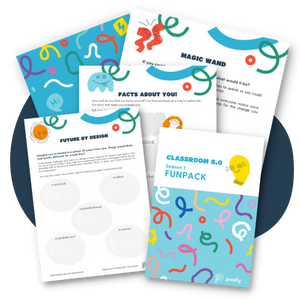
download your free fun pack!
Sign up to our Classroom 5.0 newsletter to keep up to date with episodes, and receive your free downloadable "Fun Pack" pack, featuring all of Season 1’s fun sheets.
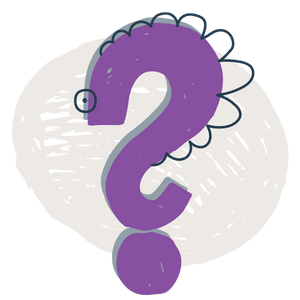
How might we bring the curriculum to life? How might we create curiosity and empathy within the current constraints of what we have?
~ CHRISTINA GERAKITEYS
Thanks for listening!
Ratings and reviews are greatly appreciated, and help with the rankings of the show, which enable us to deliver you more interviews with people whose insights help us imagine and design future learning spaces. We do read each and every one of them, and are very grateful for your time and feedback.. And remember to subscribe to the show on iTunes to get automatic updates. It’s free!
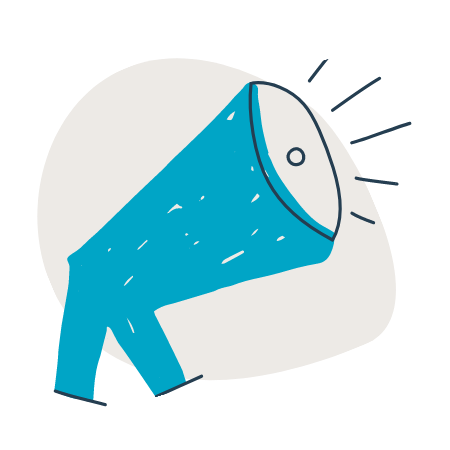

Fast track your student's access to learning future skills and mindsets!
A student-led and evidence-based wellbeing and career development platform to help young people uncover and deliver their unique potential.
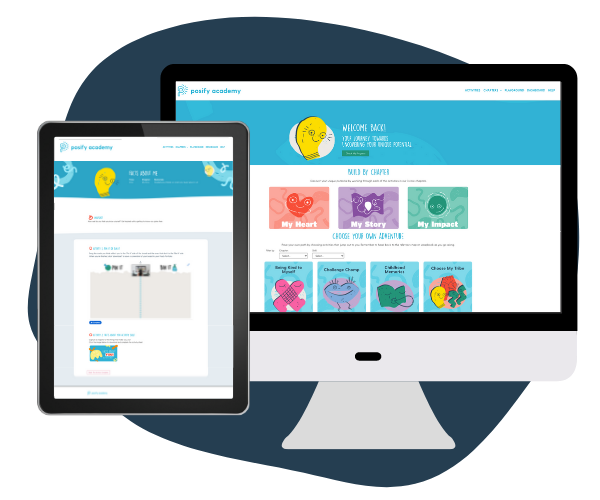
We acknowledge the Traditional Owners of our homeland, Birpai Country, and of the lands throughout Australia. We celebrate the diversity of Aboriginal and Torres Strait Islander peoples and their ongoing cultures and connections to lands and waters. We pay our respects to Elders past, present and emerging.
- © 2020 The Posify Group
- Privacy Policy & Disclaimer
- Website by Webstudio


